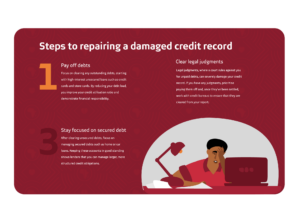Steps to building and maintaining a healthy credit record
One of the most effective ways to write your story is through investing. However, understanding the how, where and for how long to invest is not always easy.
If you want to say “I grew it,” then putting your hard-earned money to work (without you having to do much at all) is simply the best way to go about it. Whether you are preparing for retirement, saving for your children’s education or simply want to grow your wealth, it’s crucial to understand how to invest in a way that best suits your needs.
There are numerous investment opportunities available that cater to different goals and risk profiles. In this article, we’ll walk you through some of the basics of investment and the options available to you, and give you some hints and tips on how to get started.
What is a Credit record and why does it matter?
Your credit record is a comprehensive summary of your financial behaviour over time. It includes details such as your payment history, the amount of debt you owe, the types of credit accounts you hold and any legal judgments against you. This information paints a complete picture of your creditworthiness, which lenders use to assess your eligibility for loans or other credit forms.
Maintaining a good credit record is crucial because it directly influences your ability to borrow money, the terms of your credit agreements and even your capacity to secure favourable interest rates. When your credit record shows responsible financial behaviour, lenders are more likely to view you as a low-risk borrower, which increases your chances of loan approval and access to better terms. Conversely, a poor credit record can lead to loan rejections, higher interest rates and limited access to credit.
You can access your credit report through major credit bureaus such as TransUnion, Experian and the Credit Bureau. Each of these platforms provides at least one free credit report annually. Reviewing your credit record regularly ensures accuracy and helps you to stay aware of your financial health.
Key factors that impact your credit record
Understanding the factors that impact your credit record is essential for building and maintaining a healthy score. These include:
Payment history
This is the most important factor affecting your credit score. It tracks whether you pay your bills on time and whether you’ve missed payments. Even a single missed payment can negatively impact your credit record, so remember to pay your bills on time, every time.
Credit utilisation ratio
This ratio represents how much of your available credit you’re currently using. A lower credit utilisation rate (ideally below 30% of your salary) is considered healthy and is a sign to lenders that you are not over-reliant on credit.
Length of credit history
The longer your credit history, the better. Lenders view a long track record of responsible credit use as a positive.
Types of credit used
New credit enquiries
Frequent credit applications in a short time frame can signal financial distress and negatively impact your score. Be selective when applying for new credit.
Consequences of a poor credit record
A poor credit record can have far-reaching consequences, both in the short and long term. The most immediate effect is difficulty in obtaining new credit, as lenders view people with poor credit records as high-risk borrowers. You could be declined for loans or, if approved, they will likely charge higher interest rates and less favourable terms.
In addition, a poor credit record can affect other areas of your life. For example, landlords and employers sometimes review credit reports when evaluating rental applications or job candidates. A bad credit record could impact your ability to rent a flat or even secure a job in certain industries.

Long term thinking for credit health
Ultimately, maintaining a healthy credit record requires long-term thinking and a balanced approach to debt. By understanding your affordability, staying informed about interest rate changes and managing your financial obligations responsibly, you can build a solid credit foundation that will benefit you throughout your financial life.
Your credit record is more than just a number; it’s a reflection of your financial habits and plays a significant role in your future opportunities. Handle your debts wisely, communicate with your bank when needed and regularly review your credit report to ensure a healthy credit record that opens doors rather than closes them.
.png)
.png)
.png)
.png)
.png)
.png)
.png)

.png)
.png)

